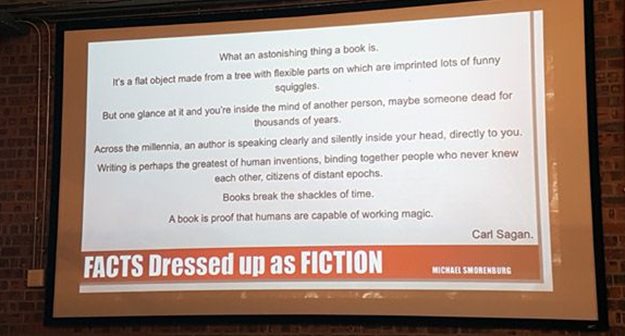
Top stories






More news















Logistics & Transport
Maersk reroutes sailings around Africa amid Red Sea constraints



Smorenburg’s Twitter bio serves as an excellent introduction to his work: “Entrepreneur. Love writing. Hate nonsense (non-science). Friend of the ocean and nature. Deeply concerned by human overpopulation and impact.”
He's also a third-generation Capetonian and has owned a chocolate factory and dotcom startup and security company, though he is lucky enough to now say he works as a full-time author, with a movie deal for one of his five published books.
As a result of his diverse experiences, Smorenburg said he’s used to talking at libraries and old age homes, where he’s told to slow down. He admits he struggled with a topic for the morning, in front of this different audience of tech-fuelled millennials, but eventually settled on ‘facts dressed up as fiction’, as his writing zooms in on overlooked details in history, anthropology and science and weaves them into engaging narratives that flow once he gets into the detail.
Describing his writing process, Smorenburg said he is a ‘pantser’ (meaning he flies by the seat of his pants), not a plotter. He never knows what will trigger him to write his next story – something unusual will grab his attention and he then writes feverishly for a few weeks, then sometimes come back to it months later to pick up the thread and finish the story.
This means he never knows what’s coming next or where the story is going and is sometimes surprised at the detail that emerges, but it all falls into place in the end.
Smorenburg shared Carl Sagan’s thoughts on what ‘an astonishing thing a book is’…

According to Smorenburg, the story of humanity is a story of storytelling.
He feels our early ancestors only stood out from the other creatures when they started telling stories, honing their language in a different way to the richness of data embodied in the songs of dolphins and the dances of bees.
'Oldest remains' outside Africa reset human migration clock https://t.co/55uJ29HNvb
— Michael TheWriter (@SmorieTheWriter) July 10, 2019
So fiction is an important part of the human experience, and a way to mark something down for millennia, a way to speak privately to other people in their minds as they read.Smorenburg told the attending students of the idea craft they will similarly spend the rest of their working lives speaking about the experience they’re trying to create, weaving a tale of how your brand will enhance consumers lives.
In his own writing, he prefers to take lesser-known facts and dress them up as fiction, telling people-based stories in such a way that he says, “If I can make a reader angry, I’ve done my job.”
Smorenburg went on to tell his own family story and kept listeners enthralled throughout the lecture. He spoke of writing his first story, LifeGames in a feverish ten-day stint – in pencil while in Spain. But on reading the end-result, he decided he didn't like it very much, so shelved it and moved on to other things.
Clarifying how he takes his writing cues from reality, he based A Trojan Affair on the goings on in Carnarvon and the SKA project, sharing that some of what he’d written about fracking has since come to pass, so the story proved fairly prophetic.
Smorenburg was intrigued to receive a 1-star review for the book on Amazon, only to find it was from the NG Kerk’s dominee in Carnarvon – that’s who played the fictional villain in Smorenburg’s story.
He’d read a third of the book, then hurled it across the room. Smorenburg asked him to please read it through to the end, as he’d been quite surprised at the twist near the end on reading the book himself – remember, he doesn’t plot out the storyline before putting pen to paper.
Smorenburg asked him not to change the review and found that he actually used it as the basis of his own PhD thesis.
#LifeGamesNOVEL A woman loses herself to a tycoon who loses control. Humanity's future requires they overcome ensuing mutual hatred #PitchCB
— Michael TheWriter (@SmorieTheWriter) June 24, 2016
He’s not one for writing blocks as he writes about what interests him in the world around him, and has played with storylines involving a band of Vikings on the fringes of society, with missing planes, in Ragnarok: Worlds Collide, and touched on the idea of bringing our ancestors into our era where cutting grass and flickering TVs are the norm we take for granted.
If you copy from one resource it’s plagiarism, but from more than three it’s research - provided you include the sources, of course.Smorenburg ended the session saying we are so fortunate today in that we can put any question out there are find myriad answers online. He put this into practice when writing his latest story, Manhattan Event.
He worked out the antipodes of what’s directly under your feet on the other side of the world, found a map-tunnelling tool, used Google Earth and Google Street View to plot and plan out the events he wrote about, and even looked at the menus his characters ordered from, online.
That's how you put fact into fiction.
